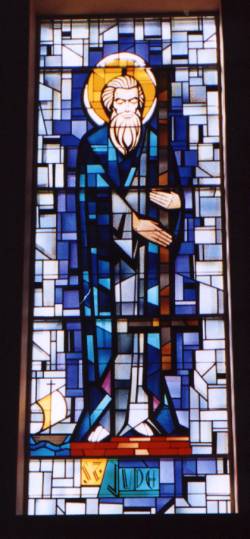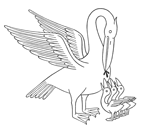
Part One: The Apostles’ Creed
12.
“
Life Everlasting”
 The closing article of the
Apostles’ Creed is also the opening door to our spiritual life. In fact, in one
sense everlasting life is the spiritual life.
The closing article of the
Apostles’ Creed is also the opening door to our spiritual life. In fact, in one
sense everlasting life is the spiritual life.
As understood in the Sacred Scriptures, eternal life begins at baptism (Romans 6:4). It is a new life, initiated by union with the death of Christ, which is symbolized and effected by baptism (Romans 6:4). It is death according to the flesh (Romans 8:12), but it is a resurrection from the life of sin (Romans 6:13). It is therefore a life conferred by holiness (Romans 5:18, 21). It is a life that is active within the Christian (I Corinthians 4:11). It is the conferral of the life of the Risen Jesus (Romans 8:11). We are thus reconciled with God by the death of Jesus, and saved by Him through a participation in His life (Romans 8:11). All of this is “everlasting life,” while still in this world and before we enter into eternity. There is more than passing value in seeing the two dimensions of everlasting life – here on earth and in the world to come. Not the least implication is that everlasting life is essentially the supernatural life. Everlasting life is natural to God alone and belongs by right only to Him. It is beyond the natural, hence above (super) the rights or claims of any creature, whether angelic or human. It is nothing less than a participation in the very life of God, by grace here below and in glory and in the heavens above. The adjective “eternal” applied to life, therefore, means not only its endless duration after bodily death. It also signifies a share in God’s own life, which is eternal because it is His life, uniquely His own. Time and again the Scriptures not only speak of God as eternal. but identify Him as God because He alone in the absolute sense is eternal. Thus Abraham is said to have “invoked Yahweh, the Everlasting God” (Genesis 21:33). “He created the heavens and the earth. Although they wear out, He remains what He is and His years are never finished” (Psalm 102:26 – 28). The adjective “eternal” (Greek = Aionios) is applied to God to signify the kind of existence that transcends time (Romans 16:26). God is the Alpha and the Omega – the first and the last letters of the Greek alphabet – because He is from everlasting unto everlasting (Revelation 1:8). He alone is without beginning because He always existed, and without end, because He will always exist. His very essence is to exist. He alone cannot not exist. And it is a share in this very life of the Trinity that we are privileged to possess in what we call time, and destined to enjoy, with God, when He calls us into eternal (anionios) life (Matthew 25:46). Our focus here is on eternal life in “the life to come,” which is the closing article of the Nicene Creed. It is also the Church’s main focus in her second millennium of commentary on the Apostles’ Creed.
Heaven as the Vision of GodThe Catholic Church identified heaven as the place and condition of perfect happiness. This happiness consists primarily in the immediate vision of God. What is this immediate vision of God? In the Church’s infallible teaching (Pope Benedict XII Benedictus Deus, 1336) the souls in heaven “see the divine essence with an intuitive and even face-to-face vision, without interposition of any creature” between God and the human soul. “Rather, the divine essence immediately manifests itself to them plainly, clearly, openly.” As a result, “Those who see the divine essence in this way receive great joy from it.” And because of this vision and enjoyment, the souls “are truly blessed and possess life and eternal rest.” Several words in this definition should be further explained:
On earth, even our deepest knowledge of God is by contrast with the world that He made. But in heaven all this will be changed. “My dear people,” the Apostle John wrote to the early Christians, “we are already the children of God. But what we are to be in the future has not yet been revealed. All we know is that when it is revealed we shall be like Him because we shall see Him as He really is” (I John 3:2). We shall behold the very reality of God.
Heavenly Enjoyment of God and of CreaturesBesides the immediate vision of God in heaven, we shall also enjoy creatures. This should not seem strange since, even on earth, God wants us to enjoy creatures – always, of course, subordinate to Himself. At the summit of these created heavenly joys is the company and mutual love of the glorified Christ, the Blessed Virgin, the angels, and saints. Christ compared heaven to a wedding feast; He promised paradise to the good thief on Calvary; and He spoke of the many mansions that He went to heaven to prepare for us. In heaven, we shall have the full use of our minds and wills. And after the resurrection our bodies will share in the heavenly joys. We may believe that knowledge we have acquired on earth will be carried into glory, along with the memory of past experiences, provided always that such knowledge will contribute to our happiness. There is also communication of minds and the exchange of affections in heaven. Why? Because heaven is a society. As described by St. John, it is “the holy city and the new Jerusalem” (Revelation 21:2). Few writers have improved on St. Thomas Aquinas’s description of the joys of heaven in his Exposition of the Apostles’ Creed: Eternal life is the perfect fulfillment of desire, because each of the blessed will have more than he desired or hoped for. In this life, no one can fulfill his desires, nor can any creature satisfy a man’s craving. God alone satisfies and infinitely surpasses man’s desires, which therefore can never rest except in God. “You have made us, O Lord, for yourself, and our heart is restless until it rests in you.” (Confessions, 1) Since in heaven the saints possess God, it is evident that their desires are satisfied and their glory exceeds their expectations. [In commenting on our Lord’s invitation to those on His right hand on the last day] “Enter into the joy of the Lord, “St. Augustine explains, that “their whole joy will not enter into the joyful, but the joyful will enter into joy.” “I shall be satisfied when your glory shall appear, “ sings the Psalmist, “who fills your desire with good things” (Psalm 16:15; 102:5). Why satisfied? Because whatsoever is delightful will be there superabundantly. Our desire for pleasure will be perfectly fulfilled because we shall possess God, who is our sovereign Good. Our desire for honor will be supremely achieved because all possible honor will be there. Our desire for knowledge will be complete because in heaven we shall know the natures of all things. We shall know all truth and whatsoever we wish to know, we shall know. We shall possess whatever we wish to possess, together with eternal life. Our desire for security will also be achieved, unlike the situation in this world. here on earth there is no assured security. The more one has, and the higher one’s position, the more reason there is to fear, and the more a person wants. But in life eternal, there is neither sorrow, nor toil, nor fear. Our desire for pleasant companionship will be experienced in the company of all the blessed. Each person in heaven will share with others whatever he has, and all will love one another and rejoice in the happiness of everyone else. Thus the joy and gladness of each one will be as great as the joy of all. St. Thomas makes sure we have no illusion about the meaning of the alternative to eternal life as everlasting joy. In common with all the great commentators on the Apostles’ Creed, he closes his exposition with a summary of the Church’s teaching on hell. The saints in heaven will have all these things and many more that surpass description. The wicked, on the other hand, will be in everlasting death. They will have no less sorrow and pain than the good will have joy and glory. Their punishment is aggravated in several ways: - Through their separation from God and from all good things. This is the pain of loss, which corresponds to aversion, and surpasses the pain of sense. - By the remorse of conscience. Yet their regret and anguish will be useless, for it will not be because of the hatred of sin, but because of the grief of their punishment. - By the intensity of the pain of sense which is inflicted by the fires of hell and which will torture both soul and body. They will feel as though they are always dying, but never dead and never going to die. That is why it is described as everlasting death. - By their despair of salvation. If only they could hope for deliverance from their agony, their punishment would be alleviated. But since they have lost all hope, their pains are exceedingly aggravated. For nineteen hundred years, the Church’s masters of the spiritual life have not ceased to dwell on this stark contrast between “everlasting life” and “everlasting death.” Augustine and Francis of Assisi, Catherine of Siena and Teresa of Avila, Ignatius Loyola and Alphonsus Liguori, Thomas More and Maximilian Kolbe – all in their own way drew the obvious conclusion. There is an eternal difference between heaven and hell. “For this reason, “ says Aquinas, “man should often call these things to mind, since he is thereby urged to do good things and draw away from evil.” That is why the Apostles’ Creed ends with the words, “everlasting life,” to make sure it becomes deeply impressed upon our memories. “May we be brought to this life by our Lord Jesus Christ, who is God blessed for ever and ever. Amen.” This is not only a prayer. It is the confident hope of everyone who professes the Apostles’ Creed and puts it into practice. 
Copyright © 2002 Inter Mirifica
Pocket Catholic Catechism |